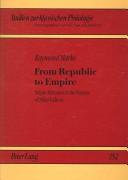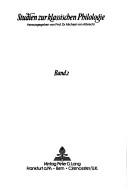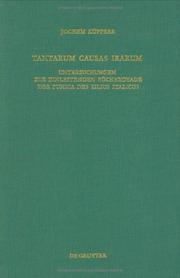| Listing 1 - 10 of 18 | << page >> |
Sort by
|
Book
ISBN: 9780198838166 0198838166 0191960217 0192694227 Year: 2022 Publisher: Oxford Oxford University Press
Abstract | Keywords | Export | Availability | Bookmark
 Loading...
Loading...Choose an application
- Reference Manager
- EndNote
- RefWorks (Direct export to RefWorks)
"Book 9 of Silius Italicus' first-century Latin epic poem Punica begins the narrative of the Battle of Cannae (August 216 bc). This book is an integral part of the epic's three-book movement that narrates one of the largest battles in Roman history. It opens with the dispute between the consuls Paulus and Varro over giving battle, in the face of hostile omens and Hannibal's record of successful combat. On the eve of the battle, the Roman soldier Solymus accidentally kills his father Satricus, thereby presenting an omen of disaster for the Roman army. After Hannibal and Varro encourage their troops, the initial phase of the battle commences. The gods descend to the battlefield, and Mars and Minerva fight the sole full-scale theomachy in Latin epic. Aeolus summons the Vulturnus wind at Juno's request to devastate the Roman ranks. After the gods have departed, Hannibal's elephant troops advance and scatter the Roman forces. The book ends by recapitulating the opening episode: Varro admits his mistake in giving battle and flees the battlefield. This volume is the first full-scale commentary in English devoted exclusively to Punica 9. It features the Latin text with a critical apparatus and a parallel English translation. Detailed commentary notes provide information on literary style, use of language, poetic intertexts, and scholarly interpretation. The Introduction offers further context and background, including sections on Silius Italicus and his era, the historiographical and rhetorical traditions that he adapted, the inter- and intratextuality of the Cannae episode, and the book's use of diction and metre"
Cannae, Battle of, Italy, 216 B.C --- Punic War, 2nd, 218-201 B.C. --- Cannae, Battle of, 216 B.C. --- Campaigns --- Silius Italicus, Tiberius Catius --- Silio, --- Silius, --- Silius Italicus, C. --- Silius Italicus, Catius --- Silius Italicus, Tiberius Catius, --- Sillius,

ISBN: 3631545843 0820498092 Year: 2005 Volume: 152 Publisher: Frankfurt am Main [etc.] Peter Lang
Abstract | Keywords | Export | Availability | Bookmark
 Loading...
Loading...Choose an application
- Reference Manager
- EndNote
- RefWorks (Direct export to RefWorks)
Politics and literature --- Punic War, 2nd,218-201 B.C. --- Literature and the war. --- Silius Italicus, Tiberius Catius. --- Silius Italicus, Tiberius Catius --- Scipio, --- Political and social views. --- In literature. --- Rome --- History --- Punic War, 2nd,218-201 B.C --- Literature and the war --- Silio, --- Silius, --- Silius Italicus, C. --- Silius Italicus, Catius --- Silius Italicus, Tiberius Catius, --- Sillius, --- Escipión, --- Escipión, Publio Cornelio, --- Scipio Africanus Major, Publius Cornelius --- Scipio Africanus, Publius Cornelius, --- St︠s︡ipion, --- Scipione, --- Scipion,

ISBN: 3820463755 Year: 1979 Volume: 2 Publisher: Frankfurt am Main Lang
Abstract | Keywords | Export | Availability | Bookmark
 Loading...
Loading...Choose an application
- Reference Manager
- EndNote
- RefWorks (Direct export to RefWorks)
Classical Latin literature --- History as a science --- Silius Italicus, Tiberius Catius Asconius --- Epic poetry, Latin --- -Punic War, 2nd, 218-201 B.C. --- -Punic wars --- Latin epic poetry --- Latin poetry --- History and criticism --- Literature and the war --- Silius Italicus, Tiberius Catius --- Silio, --- Silius, --- Silius Italicus, C. --- Silius Italicus, Catius --- Silius Italicus, Tiberius Catius, --- Sillius, --- Carthage (Extinct city) --- -Rome --- Carthage (Ancient city) --- Carthago (Extinct city) --- Kart Hadasht (Extinct city) --- Qarțājannah (Extinct city) --- Tunisia --- In literature --- In literature. --- Antiquities --- Punic War, 2nd, 218-201 B.C. --- History and criticism. --- Literature and the war. --- Silius Italicus, Tiberius Catius. --- Rome --- -History and criticism --- Punic War, 2nd, 218-201 B.C

ISBN: 3110106108 3111885399 3110863928 Year: 1986 Volume: vol 23 Publisher: Berlin de Gruyter
Abstract | Keywords | Export | Availability | Bookmark
 Loading...
Loading...Choose an application
- Reference Manager
- EndNote
- RefWorks (Direct export to RefWorks)
Epic poetry, Latin --- -Punic War, 2nd, 218-201 B.C. --- -Punic wars --- Latin epic poetry --- Latin poetry --- History and criticism --- Literature and the war --- Silius Italicus, Tiberius Catius --- Silio, --- Silius, --- Silius Italicus, C. --- Silius Italicus, Catius --- Silius Italicus, Tiberius Catius, --- Sillius, --- Carthage (Extinct city) --- -Rome --- Carthage (Ancient city) --- Carthago (Extinct city) --- Kart Hadasht (Extinct city) --- Qarțājannah (Extinct city) --- Tunisia --- In literature --- In literature. --- Antiquities --- Punic War, 2nd, 218-201 B.C. --- History and criticism. --- Literature and the war. --- Silius Italicus, Tiberius Catius. --- Rome --- -History and criticism --- Punic War, 2nd, 218-201 B.C --- Silius Italicus (Tiberius Catius Asconius). Punica. I-II.
Book
ISBN: 3820454039 9783820454031 Year: 1984 Volume: 8 Publisher: Frankfurt am Main Lang
Abstract | Keywords | Export | Availability | Bookmark
 Loading...
Loading...Choose an application
- Reference Manager
- EndNote
- RefWorks (Direct export to RefWorks)
Epic poetry, Latin --- History and criticism --- Jupiter --- Valerius Flaccus, Gaius, --- Silius Italicus, Tiberius Catius --- Statius, P Papinius --- Rome --- History --- -Jupiter (Roman deity) in literature --- Latin epic poetry --- Latin poetry --- Statius, P. Papinius --- Valerius Flaccus, Gaius --- Silio, --- Silius, --- Silius Italicus, C. --- Silius Italicus, Catius --- Silius Italicus, Tiberius Catius, --- Sillius, --- -Epic poetry, Latin --- Jupiter (Roman deity) in literature. --- History and criticism. --- Silius Italicus, Tiberius Catius. --- Publius Papinius Statius --- Statius, Papinius --- Stace --- Jupiter (Roman deity) in literature --- Jupiter - (Roman deity) --- Valerius Flaccus, Gaius, - active 1st century - Argonautica --- Silius Italicus, Tiberius Catius - Punica --- Statius, P Papinius - (Publius Papinius) - Thebais
Book

ISBN: 3110314304 9783110314304 9783110314274 3110314274 3110314312 Year: 2013 Publisher: Berlin Boston
Abstract | Keywords | Export | Availability | Bookmark
 Loading...
Loading...Choose an application
- Reference Manager
- EndNote
- RefWorks (Direct export to RefWorks)
This volume on the three Flavian epic poets (Valerius Flaccus, Statius and Silius Italicus) for the first time critically engages with a unique set-up in Roman literary history: the survival of four epic poems from the same period (Argonautica; Thebaid, Achilleid; Punica). The interactions of these poems with each other and their contemporary context are explored by over 20 experts and emerging scholars. Topics studied include the political dimension of the epics, their use of epic themes and techniques and their intertextual relationship among each other and to predecessors. The recent upsurge of interest in Flavian epic has been focused on the analysis of individual works. Looking at these poems together now allows the appreciation of their similarities and nuanced differences in the light of their shared position in literary and political history and gives insights into the literary culture of the period. The different approaches and backgrounds of the contributors ensure the presentation of a range of viewpoints. Together they offer new perspectives to the still increasing readership of Flavian epic poetry but also to anyone interested in the epic genre within Roman literature or other cultures more generally.
Epic poetry, Latin --- History and criticism. --- Valerius Flaccus, Gaius, --- Silius Italicus, Tiberius Catius --- Statius, P. Papinius --- Silio, --- Silius, --- Silius Italicus, C. --- Silius Italicus, Catius --- Silius Italicus, Tiberius Catius, --- Sillius, --- Flacco, Valerio, --- Flaccus, Gaius Valerius, --- Valerio Flacco, --- Valerius Flaccus, --- Valerius Flaccus, C. --- Valerius Flaccus, C., --- Valerius Flaccus, Caius, --- Valerius Flaccus Setinus Balbus, C., --- Estacio --- Stace --- Statius, Papinius --- Statius, Publius Papinius --- Stat︠s︡iĭ, Publiĭ Papiniĭ --- Стаций, Публий Папиний --- Criticism and interpretation. --- Stazio --- Valerius Flaccus, Gaius --- Gaius Valerius Flaccus --- Valerius Flaccus Setinus Balbus, Caius --- Valerius Flaccus --- Flavian literature. --- Roman epic. --- intertextuality.
Book
ISBN: 1781385920 1781387257 1781380287 Year: 2014 Publisher: Liverpool : Liverpool University Press,
Abstract | Keywords | Export | Availability | Bookmark
 Loading...
Loading...Choose an application
- Reference Manager
- EndNote
- RefWorks (Direct export to RefWorks)
Silius Italicus' Punica, the longest surviving epic in Latin literature, has seen a resurgence of interest among scholars in recent years. A celebration of Rome's triumph over Hannibal and Carthage during the second Punic war, Silius' poem presents a plethora of familiar names to its readers: Fabius Maximus, Claudius Marcellus, Scipio Africanus and, of course, Rome's 'ultimate enemy' - Hannibal.Where most recent scholarship on the Punica has focused its attention of the problematic portrayal of Scipio Africanus as a hero for Rome, this book shifts the focus to Carthage and offers a new reading of Hannibal's place in Silius' epic, and in Rome's literary culture at large. Celebrated and demonised in equal measure, Hannibal became something of an anti-hero for Rome; a man who acquired mythic status, and was condemned by Rome's authors for his supposed greed and cruelty, yet admired for his military acumen.For the first time this book provides a comprehensive overview of this multi-faceted Hannibal as he appears in the Punica and suggests that Silius' portrayal of him can be read as the culmination to Rome's centuries-long engagement with the Carthaginian in its literature. Through detailed consideration of internal focalisation, Silius' Hannibal is revealed to be a man striving to create an eternal legacy, becoming the Hannibal whom a Roman, and a modern reader, would recognise. The works of Polybius, Livy, Virgil, and the post Virgilian epicists all have a bit-part in this book, which aims to show that Silius Italicus' Punica is as much an example of how Rome remembered its past, as it is a text striving to join Rome's epic canon.
Epic poetry, Latin --- History and criticism. --- Hannibal, --- Silius Italicus, Tiberius Catius --- Silius Italicus, Tiberius Catius. --- Silio, --- Silius, --- Silius Italicus, C. --- Silius Italicus, Catius --- Silius Italicus, Tiberius Catius, --- Sillius, --- ʼAnibāl, --- Annibal, --- Annibale, --- Annibas, --- Gannibal, --- Ḥanibaʻal, --- Hanībaʻl, --- חניבעל, --- هنيبال --- In literature. --- Criticism and interpretation. --- هيني بال --- Epic poetry, Latin / History and criticism. --- Epic poetry, Latin. --- Literature. --- Hannibal / 247 B.C.-182 B.C. / In literature. --- Silius Italicus, Tiberius Catius / Criticism and interpretation. --- Silius Italicus, Tiberius Catius / Punica. --- Silius Italicus, Tiberius Catius Asconius --- Hannibal --- Punica (Silius Italicus, Tiberius Catius)
Book
ISBN: 9140042022 Year: 1976 Volume: vol 1976-1977/1 Publisher: Lund : Liber-Läromedel/Gleerup,
Abstract | Keywords | Export | Availability | Bookmark
 Loading...
Loading...Choose an application
- Reference Manager
- EndNote
- RefWorks (Direct export to RefWorks)
Epic poetry, Latin --- Punic War, 2nd, 218-201 B.C --- Poésie épique latine --- Guerre punique, 2e, 218-201 av. J.-C. --- History and criticism --- Literature and the war --- Histoire et critique --- Littérature et guerre --- Silius Italicus, Tiberius Catius --- Criticism and interpretation --- Carthage (Extinct city) --- Rome --- Carthage (Ville ancienne) dans la littérature --- Rome dans la littérature --- In literature --- -Punic War, 2nd, 218-201 B.C. --- -Punic wars --- Latin epic poetry --- Latin poetry --- Silio, --- Silius, --- Silius Italicus, C. --- Silius Italicus, Catius --- Silius Italicus, Tiberius Catius, --- Sillius, --- -Rome --- Carthage (Ancient city) --- Carthago (Extinct city) --- Kart Hadasht (Extinct city) --- Qarțājannah (Extinct city) --- Tunisia --- In literature. --- Antiquities --- Punic War, 2nd, 218-201 B.C. --- History and criticism. --- Literature and the war. --- Silius Italicus, Tiberius Catius. --- -History and criticism --- -Latin epic poetry --- Poésie épique latine --- Littérature et guerre --- Carthage (Ville ancienne) dans la littérature --- Rome dans la littérature --- Criticism and interpretation.
Book
ISBN: 9782870312636 2870312636 Year: 2009 Volume: 322 Publisher: Bruxelles Latomus
Abstract | Keywords | Export | Availability | Bookmark
 Loading...
Loading...Choose an application
- Reference Manager
- EndNote
- RefWorks (Direct export to RefWorks)
Landscapes in literature --- Epic poetry, Latin --- History and criticism. --- Statius, P. Papinius --- Silius Italicus, Tiberius Catius --- Nature in literature --- Description (Rhetoric) --- Latin literature --- History and criticism --- Statius, P Papinius --- Criticism and interpretation --- Nature in poetry --- Landscape in literature --- Descriptive writing --- Rhetoric --- Estacio --- Stace --- Statius, Papinius --- Statius, Publius Papinius --- Silio, --- Silius, --- Silius Italicus, C. --- Silius Italicus, Catius --- Silius Italicus, Tiberius Catius, --- Sillius, --- Criticism and interpretation. --- Stat︠s︡iĭ, Publiĭ Papiniĭ --- Стаций, Публий Папиний --- Stazio --- Latin literature - History and criticism --- Statius, P Papinius - (Publius Papinius) - Criticism and interpretation --- Silius Italicus, Tiberius Catius - Criticism and interpretation --- Silius italicus, tiberius catius (0025-0101) --- Stace (0040?-0096) --- Paysage --- Cadre de l'œuvre --- Dans la littérature --- Statius, P Papinius - (Publius Papinius)
Book
ISBN: 9789004324527 9004324526 9789004324664 9004324666 Year: 2016 Volume: 394 Publisher: Leiden Boston
Abstract | Keywords | Export | Availability | Bookmark
 Loading...
Loading...Choose an application
- Reference Manager
- EndNote
- RefWorks (Direct export to RefWorks)
Family in Flavian Epic examines the treatment of family bonds in Valerius Flaccus’ Argonautica , Statius’ Thebaid and Achilleid , and Silius Italicus’ Punica . The eleven contributions consider the representation of epic parents, children, siblings, and spouses, and their interaction with each other, demonstrating the Flavian poets’ engagement with their epic, and more generally literary, tradition. At the same time, Roman attitudes towards the family and Flavian concerns especially related to dynastic harmony and civil war also characterise both historical and mythological members of Flavian epic families.
Epic poetry, Latin --- Families in literature --- Kinship in literature --- Poésie épique latine --- Familles dans la littérature --- Parenté dans la littérature --- History and criticism --- Congresses. --- Congresses --- Histoire et critique --- Congrès --- Valerius Flaccus, Gaius, --- Statius, P. Papinius --- Silius Italicus, Tiberius Catius. --- Epic poetry, Latin. --- Families in literature. --- Kinship in literature. --- Silius Italicus, Tiberius Catius --- Criticism and interpretation --- Argonautica (Valerius Flaccus, Gaius). --- Statius, P. Papinius. --- Family in literature --- Latin epic poetry --- Latin poetry --- E-books --- Poésie épique latine --- Familles dans la littérature --- Parenté dans la littérature --- Congrès --- Silio, --- Silius, --- Silius Italicus, C. --- Silius Italicus, Catius --- Silius Italicus, Tiberius Catius, --- Sillius, --- Estacio --- Stace --- Statius, Papinius --- Statius, Publius Papinius --- Stat︠s︡iĭ, Publiĭ Papiniĭ --- Стаций, Публий Папиний --- Stazio --- Epic poetry, Latin - History and criticism - Congresses --- Families in literature - Congresses --- Kinship in literature - Congresses
| Listing 1 - 10 of 18 | << page >> |
Sort by
|

 Search
Search Feedback
Feedback About UniCat
About UniCat  Help
Help News
News